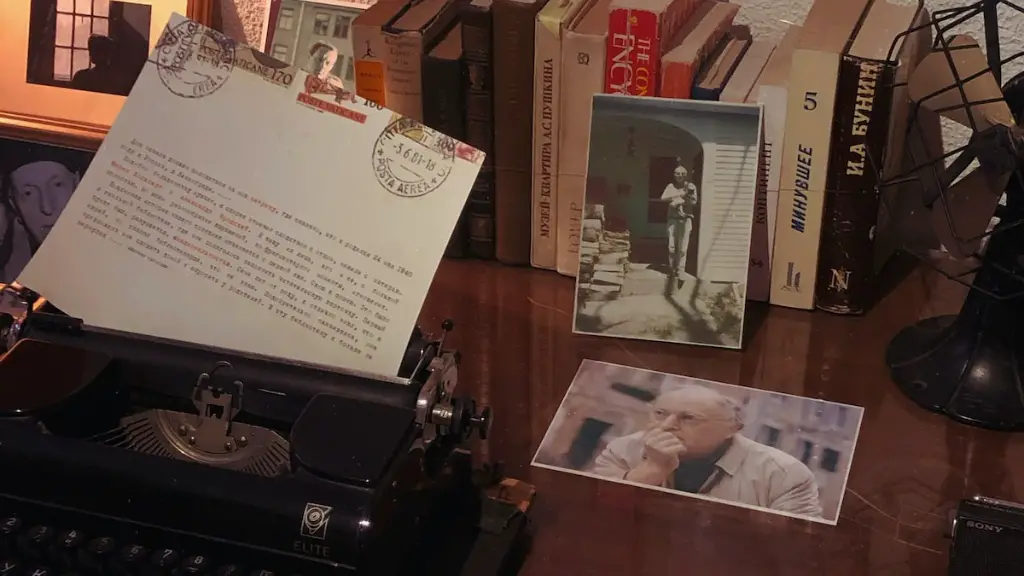Understanding the Basics of Poetry
When teaching poetry to first graders, it is important to teach them the basics of poetry before diving into writing and reading their own work. Teach them the key features of poetry, such as rhythm, rhyme and meter. Explain that poetry allows writers to choose their words carefully and to creatively convey a message. Provide examples of poems, showing the students the variety that is possible in the structure, use of phrases and words, and the themes of the poem.
Encourage the first graders to play and experiment with their own words. Give them prompts to try and create their own rhymes. Talk about the different types of poetry and explain how the basic idea for a poem can be used to create haikus, limericks, sonnets and more. Make the lesson engaging, allowing the students to move around, draw and write.
Introducing Visual Art
First graders may find it helpful to explore visual art when learning about poetry. Show them examples of works of art that relate to poetry and explain how they fit into the poetry genre. Allow them to create their own art based on a particular poem, giving them the chance to express their creative vision while also engaging with a poem.
Encourage the students to think about the emotions that poems can evoke, and have them draw their response to the poem. This can help them to get in touch with their own feelings and think about what the writer is trying to convey.
Turn poetry into a game and ask the first graders to draw a picture from what they see in a poem. Ask them to read a poem, then ask them questions and see if they can draw their answers. This can help to build their comprehension skills, as well as connecting the poem to things they can see in real life.
Exploring the Power of Poetry
Another way to teach poetry to first graders is to explore the power of poetry. Show them examples of poems that have inspired change, such as the civil rights movement and the women’s suffrage movement. Show them examples of poems that address social and political issues.
Explain that poetry can be used to express feelings, ideas and opinions and to evoke powerful responses. This can help the first graders to understand that their ideas and feelings are valuable, and that they can use poetry to express them.
Encourage the students to read out loud their own and other people’s poetry. This will help them to develop their literacy skills and to understand the power of words.
Encouraging Creative Writing
When teaching poetry to first graders, it is important to focus on creative writing. Explain to the students that the most interesting poetry is often unique and personal, and that it is a great form of expression. Encourage them to feel comfortable expressing themselves through their writing and to focus on finding their own voice.
Help the students to come up with their own ideas for poems, and provide guidance and feedback as they write. Ask them to write about things they are passionate about, such as their favorite animals or sports teams, and discuss the creative choices they make in their writing.
Allow them to read their poems to the class and give feedback to each other. Encourage the students to collaborate and to read each other’s poems to gain inspiration.
Developing Performance Skills
Performance can play a large role when teaching poetry to first graders. Explain the importance of gesture, voice, rhythm and timing when performing a poem. Give the students the opportunity to practice their performance skills, such as speaking in a dramatic or exaggerated voice and emphasizing particular words.
Allow the students to stand up in front of the class and perform a poem, or put on a show for their peers. Encourage them to be creative and to use their bodies and voices to help convey the meaning of the poem. Perform some poems yourself as well and help the students to see the power of performance.
Creating a Poetry Showcase
One way to help first graders understand the power of poetry is to create a poetry showcase. Invite the parents and other members of the community to join in and hear their students’ poems. Ask the first graders to perform their poems to the audience, allowing them to view the poems in another light.
Encourage the students to dress up for their performance as well, which can add to the drama and excitement of the evening. The showcase can be a great way for the students to show off their work, as well as deepen their understanding of the power of poetry.
Incorporating Technology
Technology can be an excellent tool when teaching poetry to first graders. Look for websites that have poet-focused activities and games, such as word searches and writing prompts. Utilize multimedia tools to create poetry videos and have the students perform their poems with a backing track.
Take the students on virtual tours of poetry-related locations, such as the homes of famous poets or the places mentioned in their poems. Allowing the students to explore the writing of professionals may help to spark their creativity and give them a greater appreciation for poetry.
Rewarding Student Success
Another way to teach poetry to first graders is to reward their success. Give the students who do well on tests and writing assignments meaningful compliments and rewards to acknowledge their achievements. Allow them to create their poems in notebooks and decorate them with stickers or stamps.
Encourage the students to enter their poems into competitions or submit them for publication. Allow them to take ownership of their work and recognize that writing and performing poetry is an accomplishment.
Organizing Poetry Reading Sessions
Organizing poetry reading sessions is another way to teach poetry to first graders. Ask the students to bring in poems they have written and have them read them aloud. Invite members of the community such as librarians, authors and poets to come in and talk about their experiences.
Allow the first graders to perform their poems to each other’s work. Ask them to talk about the ideas in each poem and lets them know that their opinions are valuable. Provide constructive feedback and positive reinforcement to reward their effort.
Conducting Poetry Workshops
Poetry workshops can be an effective way to teach poetry to first graders. Ask the students to bring in poems they have written and provide guidance and feedback. Explain the basics of poetic language and talk about the different types of poetry.
Encourage the students to think critically about the poem and explain the theme of the poem. Lead discussion about how the poem relates to the world and what impact it might have. Ask them to make suggestions for revision and provide encouragement as they work on their poems.
Taking Poetry Outside the Classroom
Finally, take poetry outside the classroom to connect the materials to the real world. Take the students on a field trip to a local park and ask them to write a poem about the sights and sounds they experience.
Allow the first graders to see how poetry can be used to explore the world around them. Explain how poems can document experiences and provide insight into the culture and history of the place they are visiting.





